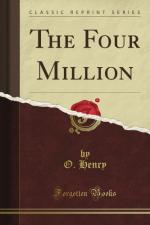The conjunction of Soapy’s receptive state of mind and the influences about the old church wrought a sudden and wonderful change in his soul. He viewed with swift horror the pit into which he had tumbled, the degraded days, unworthy desires, dead hopes, wrecked faculties and base motives that made up his existence.
And also in a moment his heart responded thrillingly to this novel mood. An instantaneous and strong impulse moved him to battle with his desperate fate. He would pull himself out of the mire; he would make a man of himself again; he would conquer the evil that had taken possession of him. There was time; he was comparatively young yet; he would resurrect his old eager ambitions and pursue them without faltering. Those solemn but sweet organ notes had set up a revolution in him. To-morrow he would go into the roaring downtown district and find work. A fur importer had once offered him a place as driver. He would find him to-morrow and ask for the position. He would be somebody in the world. He would—
Soapy felt a hand laid on his arm. He looked quickly around into the broad face of a policeman.
“What are you doin’ here?” asked the officer.
“Nothin’,” said Soapy.
“Then come along,” said the policeman.
“Three months on the Island,” said the Magistrate in the Police Court the next morning.
AN ADJUSTMENT OF NATURE
In an art exhibition the other day I saw a painting that had been sold for $5,000. The painter was a young scrub out of the West named Kraft, who had a favourite food and a pet theory. His pabulum was an unquenchable belief in the Unerring Artistic Adjustment of Nature. His theory was fixed around corned-beef hash with poached egg. There was a story behind the picture, so I went home and let it drip out of a fountain-pen. The idea of Kraft—but that is not the beginning of the story.
Three years ago Kraft, Bill Judkins (a poet), and I took our meals at Cypher’s, on Eighth Avenue. I say “took.” When we had money, Cypher got it “off of” us, as he expressed it. We had no credit; we went in, called for food and ate it. We paid or we did not pay. We had confidence in Cypher’s sullenness end smouldering ferocity. Deep down in his sunless soul he was either a prince, a fool or an artist. He sat at a worm-eaten desk, covered with files of waiters’ checks so old that I was sure the bottomest one was for clams that Hendrik Hudson had eaten and paid for. Cypher had the power, in common with Napoleon III. and the goggle-eyed perch, of throwing a film over his eyes, rendering opaque the windows of his soul. Once when we left him unpaid, with egregious excuses, I looked back and saw him shaking with inaudible laughter behind his film. Now and then we paid up back scores.




